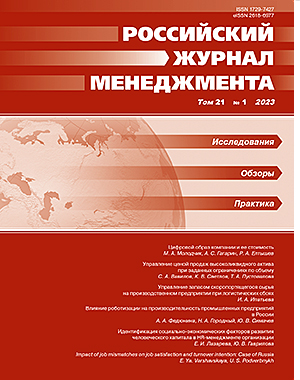Perishable inventory management in manufacturing during logistics disruptions
DOI:
https://doi.org/10.21638/spbu18.2023.103Abstract
Goal: to analyze the features of the perishable raw materials management at a manufacturing enterprise, determine the key factors affecting the inventory management efficiency and, in accordance with them, adapt the classical model for determining the optimal delivery batch.
Methodology: an empirical study of the factors was carried out using a critical analysis of the scientific literature; model formalization was implemented using mathematical methods for modeling rational systems in accordance with the algorithm for formulating optimization models, converted for perishable raw materials.
Findings: key themes of model modifications for manufacturing enterprises were identified; the required model is formulated; a numerical experiment was carried out and the sensitivity of the model parameters was revealed, the results of which can be applied to improve inventory management strategies in other sectors of the national economy.
Originality and contribution of the author: for the first time in Russia, this study presents an adapted model for determining the optimal delivery lot, which simultaneously takes into account such parameters as the susceptibility of the stock to quality deterioration processes, the likelihood of failures and breakdowns at the supply stage, the possibility of shortages under scenarios with delayed full or partial satisfaction, as well as with the application of the strategy of acceptance of this risk by the enterprise.
Keywords:
manufacturing, shortage, disruptions, losses, perishable stock, EOQ model, optimal delivery lot
Downloads
Downloads
Published
How to Cite
Issue
Section
License
Articles of the Russian Management Journal are open access distributed under the terms of the License Agreement with Saint Petersburg State University, which permits to the authors unrestricted distribution and self-archiving free of charge.





